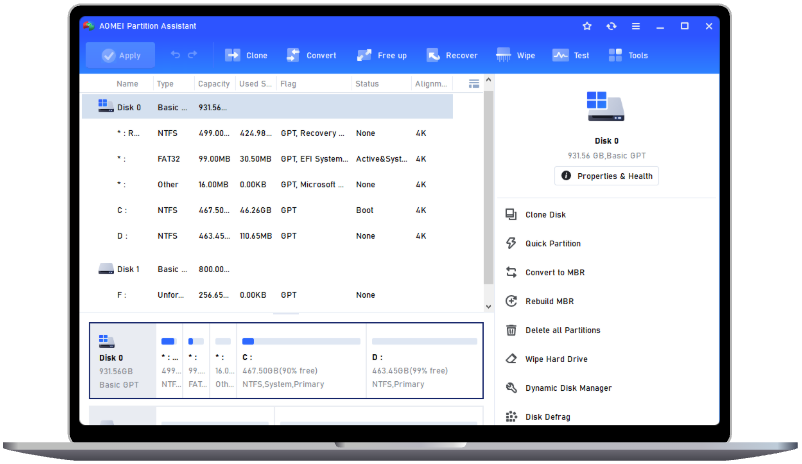Is It Worth Upgrading An HDD to an SSD For Gaming?
Is it worth upgrading an HDD to an SSD? This post will share several aspects to help you choose SSD or HDD for gaming smoothly.
About ten years ago, SSDs caused a lot of excitement. Some people really liked them, while others weren't so sure. Nowadays, some people still hesitate to switch from HDD to SSD because they worry about the cost, whether it will work with their older computers, and whether the benefits are actually worth it.
A person on Reddit shared, "I used to doubt SSDs for a long time, even though it's clear they're much better than HDDs. But things changed when I upgraded to an SSD, especially for gaming." Is that true? Today, let's figure out if upgrading from an HDD to an SSD is really worth it for gaming.
Is it worth upgrading an HDD to an SSD for gaming
As a gamer, you might think about buying cool gaming chairs and top-quality monitors. Those are good upgrades, but if you don't get the right kind of storage, like solid state drives (SSD), your gaming might not be as good.
Even though SSDs cost more than regular hard drives (HDD), computer geeks still say it's worth it to upgrade, even if it costs more. So, what's the real difference between SSDs and HDDs, and why should gamers switch to SSDs? So, this time, we’ll make a comparison to help you figure it out.
Data Speed
HDD or SSD for gaming: Is SSD better than HDD? SSDs generally outpace HDDs in data transfer, leading to quicker game loading for smoother experiences. A survey shows SSDs boot in 10-13 seconds, while HDDs take 30-40 seconds. SSDs maintain their lead in loading games or apps.
"The Elder Scrolls V: Skyrim" serves as a prime illustration of SSD superiority over HDD. When played on an SSD, the game benefits from faster data transfer speeds, resulting in notably reduced loading times when transitioning between different areas, entering buildings, or loading save files. Conversely, on an HDD, loading times in Skyrim can be significantly longer, potentially disrupting gameplay flow and immersion.
Price
In the past, SSDs used to be pricier than HDDs for the same storage space. For instance, about two years ago, a 1TB internal 2.5-inch HDD would cost around $40 to $60, while the least expensive 1TB SSDs of the same size and type tended to be around $100. The cost difference was even more noticeable if you looked at larger 3.5-inch hard drives.
However, things have changed. Over time, SSD prices have been dropping consistently, while HDD prices have mostly stayed the same, especially for larger storage capacities. SSDs used to be much more expensive per gigabyte compared to HDDs, but this gap has been getting smaller.
Capacity
SSDs are known for their speed and responsiveness. In the past, they were often in the range of 500GB to 1TB. However, as programs and games have grown larger, smaller storage doesn't make sense anymore. This has led to the introduction of larger capacity SSDs.
On the flip side, if you're focused on affordability and storage, HDDs are a solid choice. They offer more storage space for your money, with capacities of 1TB or more, and they're generally cheaper than SSDs. However, though, that games might load a bit slower on an HDD.
For an optimized gaming experience, it is better to consider SSDs in the 500GB to 1TB range. These sizes allow for multiple games and faster loading times. Alternatively, combining a larger HDD with a smaller SSD can strike a balance between storage and performance.
Frame rate
SSDs improve gaming performance by making games load faster and transitions smoother, but they can't enhance graphics or directly raise frame rates significantly during gameplay. In contrast, HDDs, being slower to access data, can sometimes lead to pauses or frame rate drops while fetching data during play.
If you're aiming for higher frame rates, investing in a more powerful GPU and CPU is a better option. Although an SSD doesn't directly impact in-game frame rates, its quicker loading can contribute to a smoother experience, particularly in open-world games with frequent loading.
Noise and temperature
SSDs are favored for their minimal noise and temperature impact during gaming due to their lack of moving parts. Unlike HDDs, which use spinning disks and mechanical components, SSDs rely on electronic storage, reducing noise and heat generation.
Games with expansive open worlds like "Red Dead Redemption 2," resource-intensive simulations or graphically demanding titles like "Cyberpunk 2077" can put a significant load on your hardware. As your computer works harder to render complex scenes and maintain high frame rates, it generates more heat, which can affect performance and potentially trigger cooling fans to work harder, leading to increased noise when you use HDD.
However, if you install these games on an SSD, the negative effects on noise and temperature won't be as noticeable as with an HDD.
How to easily upgrade HDD to SSD when cloning disk
About “Is it worth changing HDD to SSD for gaming?” The answer can be positive. If you prepare to upgrade HDD to SSD, but afraid of the complex process of data transfer. Here’s an easy solution.
AOMEI Partition Assistant Professional offers comprehensive disk cloning without any data loss and is compatible with most Windows versions. It provides both sector-by-sector and quickly clone modes. If you plan to a smaller SSD, the latter mode allows you to easily copy larger disks onto smaller ones.
Step 1.Install and launch AOMEI Partition Assistant, click the "Clone" main tab and select "Clone Disk". (You can also right-click the Disk you want to clone and select the "Clone Disk" tool to run disk clone.)
Step 2. Choose the hard disk that you need to clone as the source disk and click "Next".
Step 3. Select the destination disk to put the data of the source disk on, and then click "Next".
Step 4. Then, you will enter the Confirm interface where you can check the source and destination disk. After all is set, you can click the "Confirm" button to continue.
In lower left corner of the window, you can click the "Settings" button to adjust the partition size on the destination disk. There are three options for you:
- Clone without resizing partitions: all partitions will be cloned to the target disk as the original partition size. It is available when the target disk is larger than the source disk. If it is smaller, this option will be grayed out.
- Fit partitions to entire disk: all partitions will be cloned to the target disk and take up its full capacity according to the original partition size proportion.
- Edit partitions on this disk: you can change every partition size on the target disk as you need.
After finishing the adjustment, please click "Save".
Notes:
- You can tick "4k alignment" to improve the reading and writing speed of SSD if the selected destination disk is an SSD storage.
- All data on this selected destination disk will be wiped out after you save the operation to physical disk. If there is important data on the destination drive, please make a backup in advance.
- If you clone to a smaller SSD, the first option is grayed out. If you select Sector-by-Sector Clone, it is unable to adjust the size on the destination disk.
Step 5. You can preview the disk cloning operating by viewing the "Pending Operations". To commit the "Pending Operations", please click "Apply" and "Proceed".
Step 6. The cloning process will start and you can check the cloning process.
Conclusion
From the compared aspects, have you got a satisfied answer about “Is it worth upgrading an HDD to an SSD?” If you decide to upgrade HDD to SSD, AOMEI Partition Assistant can provide easy solutions for you.
Other features are also be practical in data transfer. You can use App Mover to transfer installed programs from one drive to another, or try Migrate OS to SSD to enhance computer performance. If you are Windows Server users, you can turn to the Server Edition for compatibility.


